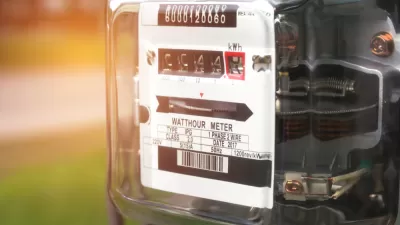Until this past summer, the Atlanta metro region was ranked second in electric car use in the United States. The generous state tax credit of $5,000 made electric vehicles (EVs) particularly attractive. But what happens when the credit is withdrawn?
The award-winning 2006 documentary, "Who Killed the Electric Car," chronicled the creation and ultimate destruction of electric vehicles (EVs) in the 1990s in the United States, with particular attention paid to the role of General Motors. That first generation of EVs led to a vast array of a new generation of plug-in electrics that the federal and many state governments promote by providing tax credits or rebates for consumers who purchase or lease them.
A scenario similar to the death of the 1990s EVs appears to be playing-out in Georgia now, but the automobile manufacturers can not be blamed in this case. What's happening there may answer the question, "How marketable are EVs without the perks?"
Reporting from Atlanta for Marketplace, Michael Caputo explains what happens when a generous state tax credit for EV ends.
About a year ago, Don Francis, coordinator of Clean Cities Georgia, would have to explain how Atlanta, Ga. could rank second in the nation in electric car use.
The market dropped like a rock,” said Francis. New registrations of electric vehicles have fallen by about 90 percent since the summer of 2015.
"A Georgian with an EV could divide that [$5,000] credit over a two-year lease and recoup about $200 a month," writes Caputo. "But in 2015, Georgia state lawmakers ended the tax incentive to find savings that offset a transportation spending bill."
What happens when EV leases expire?
"A lot of these people made the decision to get in these cars not because of the environment. They wanted to get in because of the math,” said Michael Beinenson, an electric car driver who is also president of the EV Club of the South. [See related blog post.]
Beinenson worries that the end of the generous tax credit will not only keep new people from adopting the electric car, but may push those who leased EV’s from renewing.
“If we don't have something out there when they release those cars, you can argue that they will go back to gasoline cars,”Beinenson said, adding that the low price of gas only makes that even more of a possibility.
Are EVs marketable in Geogia without the $5,000 state credit?
"The credit jumpstarted the market,” said Tim Echols, a Republican member of the state’s Public Service Commission,that oversees energy policy. But he added that the market is “not quite mature.”
Gas-powered cars contribute to transportation funding in Georgia through a gas tax. This year, lawmakers imposed a $200 road user fee on alternative fuel vehicles, including electric cars. [Note that the new fee accompanied a gas tax increase.]
It will be interesting to see what happens to the EV market in the Peach State as it could set a precedent for other states, and even the federal government if it was to reduce or eliminate the $7,500 tax credit. Some EVs may fare better than others. I suspect the credits may have the least effect on the $70,000-plus Tesla Model S, now the best-selling electric vehicle in the U.S.
According to Plug-In America's United States Incentives Map, the only perk received by EV drivers in Georgia is the ability to drive in the carpool lane.
Final word goes to EV advocate Paul Scott who emailed why these vehicles receive financial incentives:
Let’s keep in mind that these 'perks' as they are called are merely attempts to level the playing field with ICE [internal combustion engine] vehicles. The “perks” ICE gets are not having to pay anything for the health, environmental, and military costs associated with oil.
FULL STORY: Georgia EV Sales Sputter Without Tax Credit

Depopulation Patterns Get Weird
A recent ranking of “declining” cities heavily features some of the most expensive cities in the country — including New York City and a half-dozen in the San Francisco Bay Area.

California Exodus: Population Drops Below 39 Million
Never mind the 40 million that demographers predicted the Golden State would reach by 2018. The state's population dipped below 39 million to 38.965 million last July, according to Census data released in March, the lowest since 2015.

Chicago to Turn High-Rise Offices into Housing
Four commercial buildings in the Chicago Loop have been approved for redevelopment into housing in a bid to revitalize the city’s downtown post-pandemic.

Google Maps Introduces New Transit, EV Features
It will now be easier to find electric car charging stations and transit options.

Ohio Lawmakers Propose Incentivizing Housing Production
A proposed bill would take a carrot approach to stimulating housing production through a grant program that would reward cities that implement pro-housing policies.

Chicago Awarded $2M Reconnecting Communities Grant
Community advocates say the city’s plan may not do enough to reverse the negative impacts of a major expressway.
City of Costa Mesa
Licking County
Barrett Planning Group LLC
HUD's Office of Policy Development and Research
Mpact Transit + Community
HUD's Office of Policy Development and Research
City of Universal City TX
ULI Northwest Arkansas
Town of Zionsville
Urban Design for Planners 1: Software Tools
This six-course series explores essential urban design concepts using open source software and equips planners with the tools they need to participate fully in the urban design process.
Planning for Universal Design
Learn the tools for implementing Universal Design in planning regulations.

























